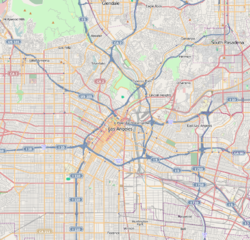Echo Park, Los Angeles
| Echo Park | |
|---|---|
| Neighborhood of Los Angeles | |

Echo Park, with the Downtown Los Angeles skyline in the background
|
|
| Location within Central Los Angeles | |
| Coordinates: 34°04′45″N 118°15′29″W / 34.0792°N 118.258°W |
Echo Park is a densely populated neighborhood of 43,000+ residents in Central Los Angeles. It contains one high school and eight other schools, and has been home to many notable people. The neighborhood is centered on the lake of the same name.
Echo Park is flanked by Elysian Valley to the north and northeast, Elysian Park to the east, Chinatown and Downtown to the southeast, Westlake to the southwest and west, and Silver Lake to the northwest.
Boundaries are the Golden State Freeway–Glendale Freeway interchange at the north apex, Riverside Drive on the northeast, Elysian Park on the east, Stadium Way and Beaudry Avenue on the southeast, the south apex being Beaudry Avenue and West Second Street and the west limit being an irregular line consisting of Second Street and Beverly Blvd, then moving upward north along Benton Way and the Glendale Freeway.
Within Echo Park are the following:
Angelino Heights is most notable for its Victorian era residences, although these are few in number. It lies at an elevation of 502 feet (153 meters).
Since the 1910s, Elysian Heights, along with Edendale, has been home to many of the counter-culture, political radicals, artists, writers, architects and filmmakers. The children of many progressives attended school there during the 1930s, '40s and '50s.
Historic Filipinotown makes up the southwest portion of Echo Park. It was created by a resolution proposed by then-City Councilmember Eric Garcetti on August 2, 2002. The district is bounded by the Hoover Street on the west to Glendale Boulevard on the east, Temple Street on the north and Beverly Boulevard on the south.
Victor Heights lies between Chinatown, Los Angeles, and the central part of Echo Park, off Sunset Boulevard near the Pasadena Freeway below Elysian Park. One of its streets is the hilly Figueroa Terrace, where in 1992 a resident named Betty Oyama lived and helped popularized a name for Victor Heights as the "Forgotten Edge," because, as she said, the Police Department couldn't figure out where Victor Heights was exactly. In a feature story about Oyama's successful fight to form a Neighborhood Watch, a Los Angeles Times reporter said of Victor Heights that it was "a mix of new and old housing styles and [of] residents who span the socioeconomic and ethnic spectrums. New condominium complexes stand next to 1920s-era bungalow houses and old apartment buildings."
...
Wikipedia

